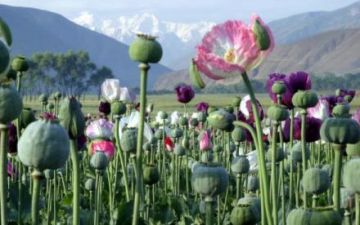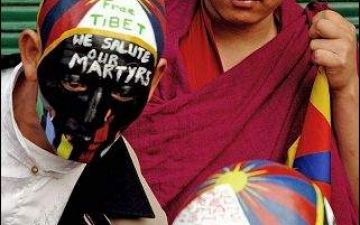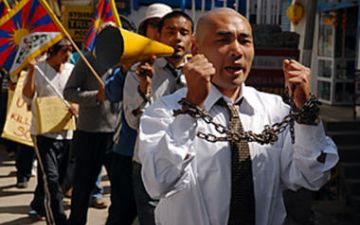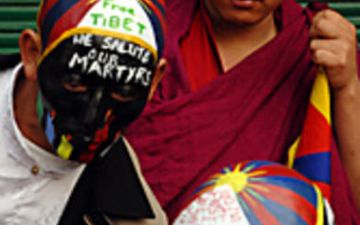Asia
Afghanistan: Mazar-i-Sharif
Afghanistan: Phoenix to Kabul
It took us five flights to get from Phoenix, where Dost and Farshad are living now, to their home city of Mazar-i-Sharif, in the north of Afghanistan. On the last leg of our trip Don and I interviewed Dost and Farshad about how they were feeling about returning home. By the last hour of the flight to Kabul the exhaustion of the difficult trip had melted away and the excitement had started to set in for Dost. He told us he was eager to see Mazar and even more so to see his bride-to-be, Fahima, who would be waiting for him at the airport.
Has War Worn Itself Out in Kashmir?
Srinagar, India -- Bullet holes are still visible along the commercial heart of Kashmir's capital, reminders of past gunbattles, bombings and suicide attacks that used to be an almost daily occurrence here.
Today, the only din is traffic and protesting bus drivers, who say the state owes them back wages. "It's been more than two years since we had any kind of explosion here," said Amir Amin, a shopkeeper. "We Kashmiris are so fed up with fighting, it's time we enjoyed business as usual."
Afghanistan: Arriving in Phoenix
Don and I left New York today on the first leg of our long journey to Afghanistan. We flew from our homebase in New York to Phoenix to meet up with Dost Mohammad and his younger brother, Farshad, as they prepared for their trip to Afghanistan.
Afghanistan: Dost Mohammad
I've known Dost Mohammad for five years now. We met when I was living in Phoenix and working as a reporter for The Arizona Republic. Dost, originally from Afghanistan, was not living in Phoenix by choice. Rather, he was there because it is where he was resettled by the U.S. government after leaving his home country as a refugee.
Afghanistan: "Failure of Expectation" on Foreign Exchange
Spring marks the beginning of the fighting season in Afghanistan, and as Afghan and western forces prepare for the Taliban offensive, others will be preparing to battle the country's second greatest threat: poppy.
But eradicating Afghanistan's most prolific and illicit crop will be hampered by past missteps and what Afghan farmers perceive as a lack of understanding when it comes to the problems they face.
A video by Shaun McCanna and Lee Ann Nelson
Pulitzer Center on Crisis Reporting / Flamingo Productions
Burma Artists Hide in Shadow Their Sad Work
It's midmorning, and Thein Soe is hard at work on a new canvas. A leader of Burma's underground art movement, he has been an artist for more than four decades.
Soe, 61, who asked that his real name not be used for fear of arrest, is bone-thin with a face that resembles Edvard Munch's expressionist painting, "The Scream." Over the years, he has weathered the junta's 46-year rule, watching the military run one of the wealthiest Southeast Asian economies into the ground, crush pro-democracy demonstrations and ban most freedom of expression.
Tibetans Question Nonviolence
DHARAMSALA, India -- Palgay spent more than two weeks dodging Chinese authorities to fulfill his lifelong dream — a face-to-face meeting with the Dalai Lama.
His journey to the seat of the spiritual leader's government-in-exile high in the Indian Himalayas began earlier last month when he paid a driver nearly $800 to hide inside a pile of luggage headed for Nepal. From there, he sneaked across the border, feeling his way along treacherous rocky terrain under the cover of darkness.
Young Tibetans Impatient with Nonviolence
Dharamsala, India -- Palgay spent more than two weeks dodging Chinese authorities to fulfill his lifelong dream - a face-to-face meeting with the Dalai Lama.
His journey to the seat of the spiritual leader's government-in-exile high in the Indian Himalayas began earlier this month when he paid a driver nearly $800 to hide inside a pile of luggage headed for Nepal. From there, he sneaked across the border, feeling his way along treacherous rocky terrain under the cover of darkness.
Young Tibetans Question Path of Nonviolence
Dharamsala, India - Jigshe Tsering spends nearly every day inside a wire enclosure outside the Dalai Lama's residence. Like most of his fellow student hunger-strikers, who have vowed to remain inside their mock cages until China eases its crackdown, he fled Tibet hoping to find a better life close to the man who has long stood as the bulwark of Tibetan identity.
Young Tibetans Question Path of Nonviolence
Reproduced with permission from The Christian Science Monitor.





